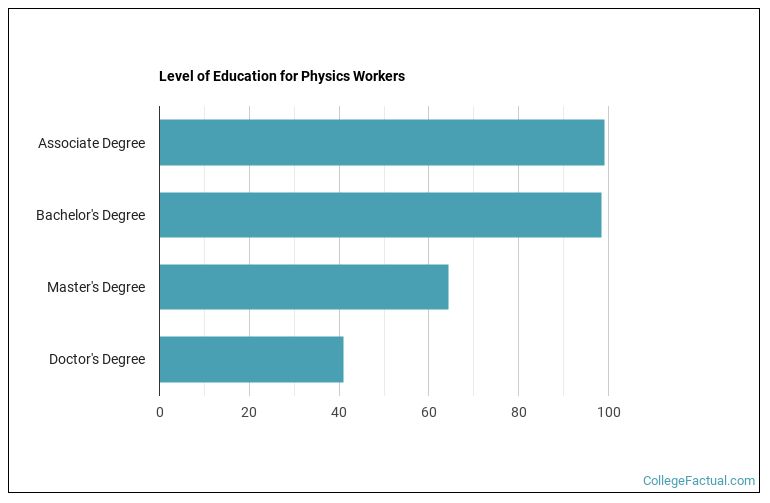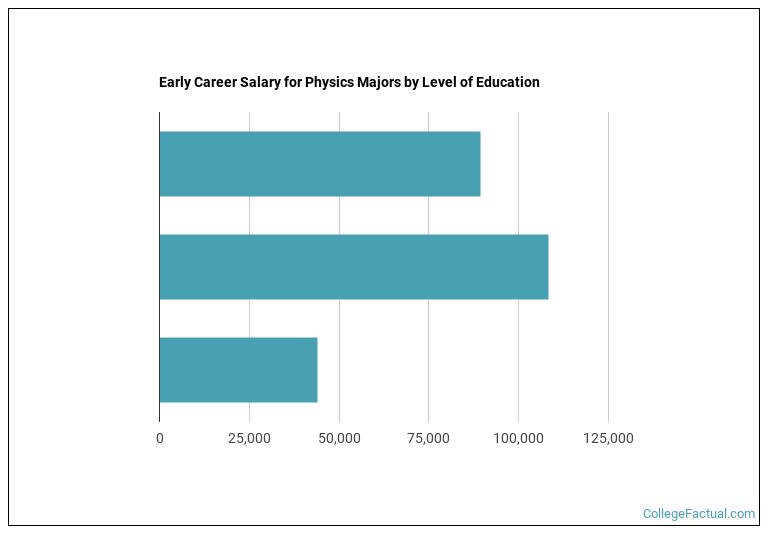 by our College Data Analytics Team
by our College Data Analytics TeamA Physics Major studies the fundamental laws of nature from gravity, to water's boiling point. As you move through your studies, you will be introduced to complex problems and use mathematical equations along with experiments to understand how things work in the natural world. Classes in topics such as mathematics, computer science, electricity and magnetism, modern physics, thermodynamics, and quantum mechanics will teach you Physics concepts, such as energy and relativity.
Physics is a large field and can be broken down into multiple areas of specializations. Depending on your college, you may have the option to choose a concentration in Atomic and Molecular Physics, Elementary Particle Physics, Plasma and High-Temperature Physics, Nuclear Physics, Optical Sciences, Condensed Matter and Materials Physics, Acoustics, or Theoretical and Mathematical Physics.
Physics was the 68th most popular major in the 2021-2022 school year. Colleges in the United States reported awarding 13,447 degrees in this year alone. This year's Best Physics Schools ranking compares 159 of them to identify the best overall programs in the country. Explore this or one of our many other custom physics rankings further below.
Physics classes involve very advanced mathematical formulas. Students should be prepared to use complex mathematic equations to solve problems and answer questions. Strong critical thinking and analytic skills will allow you to create innovative experiments and ensure necessary accuracy. Since you will be working with others, teamwork and communication skills are also important in this field.
Most Physics jobs require you to have at least a master's degree. Those who are interested in performing advanced research or holding permanent jobs at universities, labs, or government offices will need to earn their Ph.D. While working towards an advanced degree, some students pursue internships or attend summer field camps. This allows them to gain experience in the field and be more competitive in job market after graduation.
New students will need to have completed high school or a GED program and each school will have their own minimum GPA and SAT/ACT test requirements. In addition to these basic physics program qualifications, to serve in some physics careers, special certification may be required outside of your degree.
Physics degree levels vary. Physics programs offered by schools range from a to a , which is the highest physics degree you can get. Depending on the physics degree you choose, obtaining your diploma can take anwhere from 1 to 4+ years.
| Degree | Credit Requirements | Typical Program Length |
|---|---|---|
| Associate Degree | 60-70 credits | 2 years |
| Bachelor’s Degree | 120 credits | 4 years |
| Master’s Degree | 50-70 credits | 1-3 years |
| Doctorate | Program required coursework including thesis or dissertation | At least 4 years |
A bachelor's degree is the most common level of education achieved by those in careers related to physics, with approximately 28.1% of workers getting one. People currently working in careers related to physics tend obtained the following education levels.
| Level of Education | Percentage of Workers |
|---|---|
| Doctoral Degree | 28.6% |
| Bachelor’s Degree | 27.3% |
| Master’s Degree | 22.8% |
| Post-Doctoral Training | 12.8% |
| Post-Baccalaureate Certificate | 6.3% |
About 64.3% of workers in careers related to physics obtain at least master's degrees. The chart below shows what degree level those who work in physics have obtained.

The education level required is different depending on the physics career you are seeking.
Physicists who pursue an advanced degree are hired in multiple industries including scientific firms, as professors at colleges, or government offices. NASA and the U.S. Department of Defense often hire physicists. Positions as secondary school physics teachers or as research assistants are available for students who obtain their bachelor's degree.
Want a job when you graduate with your physics degree? Physics careers are expected to grow 7.8% between 2016 and 2026.
The following options are some of the most in-demand careers related to physics.
| Occupation Name | Projected Jobs | Expected Growth |
|---|---|---|
| High School Teachers | 1,095,500 | 7.5% |
| Natural Sciences Managers | 62,300 | 9.9% |
| Physicists | 20,500 | 14.5% |
| Physics Postsecondary Professors | 19,400 | 10.2% |
Recently graduated physics students earned an average of $47,174 in <nil>. Earnings can range from as low as $19,977 to as high as $116,750. As you might expect, salaries for physics graduates vary depending on the level of education that was acquired.

Salaries for physics graduates can vary widely by the occupation you choose as well. The following table shows the top highest paying careers physics grads often go into.
| Occupation Name | Median Average Salary |
|---|---|
| Natural Sciences Managers | $139,680 |
| Physicists | $125,280 |
| Physics Postsecondary Professors | $103,830 |
| High School Teachers | $64,340 |
With over 1,812 different physics degree programs to choose from, finding the best fit for you can be a challenge. Fortunately you have come to the right place. We have analyzed all of these schools to come up with hundreds of unbiased physics school rankings to help you with this.
One of 8 majors within the Physical Sciences area of study, Physics has other similar majors worth exploring.
| Major | Annual Graduates |
|---|---|
| General Physics | 12,551 |
| Other Physics | 502 |
| Optics/Optical Sciences | 220 |
| Acoustics | 121 |
| Theoretical & Mathematical Physics | 33 |
| Related Major | Annual Graduates |
|---|---|
| Chemistry | 20,985 |
| Geological & Earth Sciences | 8,124 |
| General Physical Sciences | 3,141 |
| Astronomy & Astrophysics | 1,396 |
| Atmospheric Sciences & Meteorology | 1,183 |
Image Credit: By A. T. Service under License More about our data sources and methodologies.